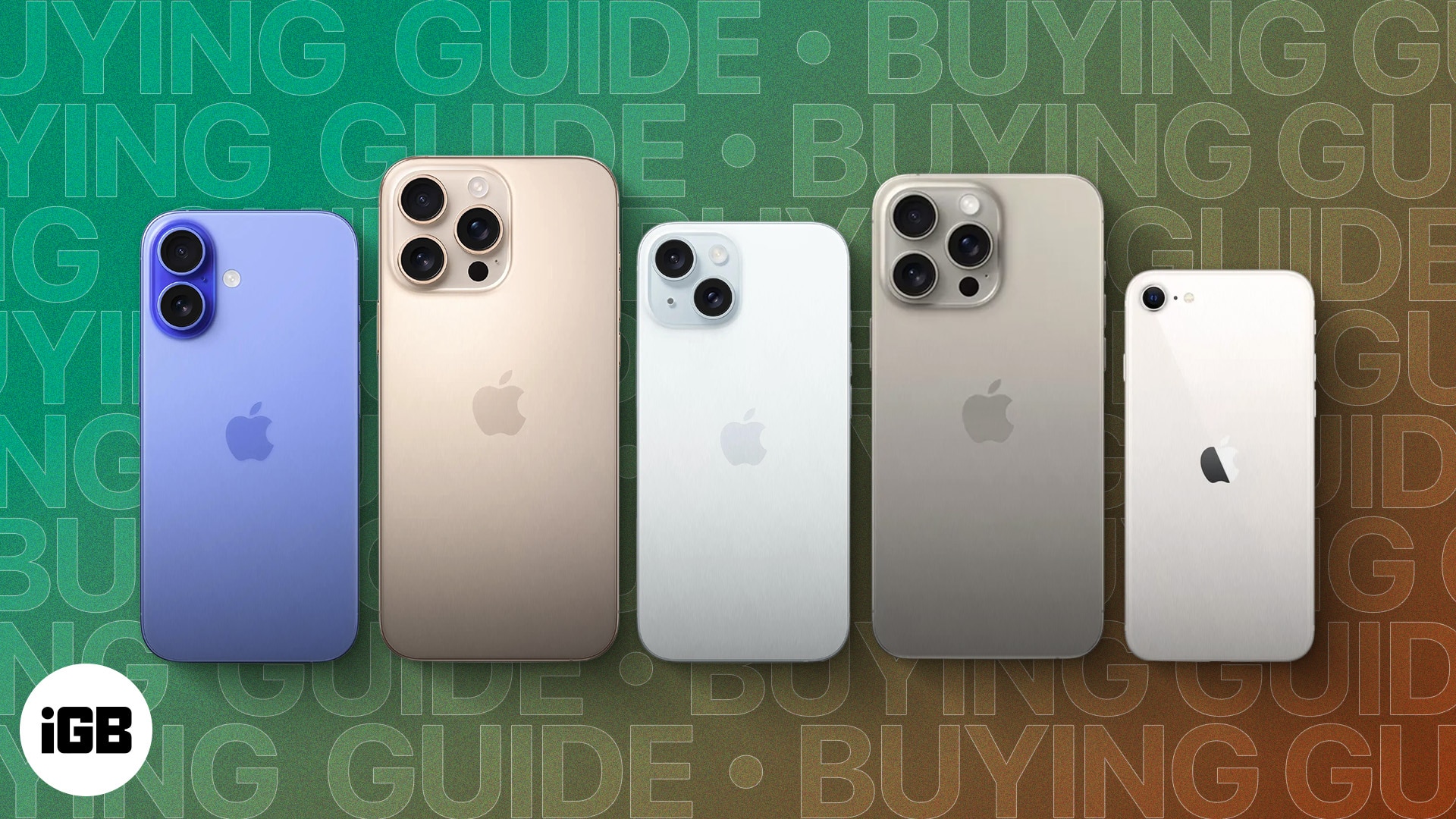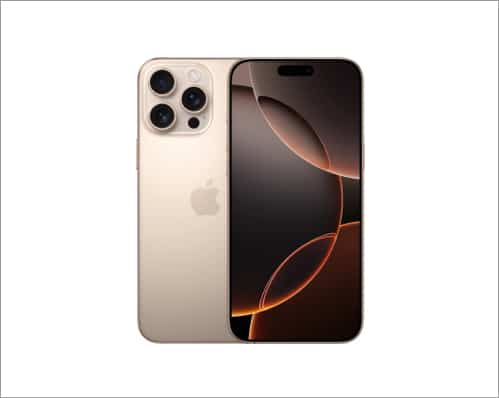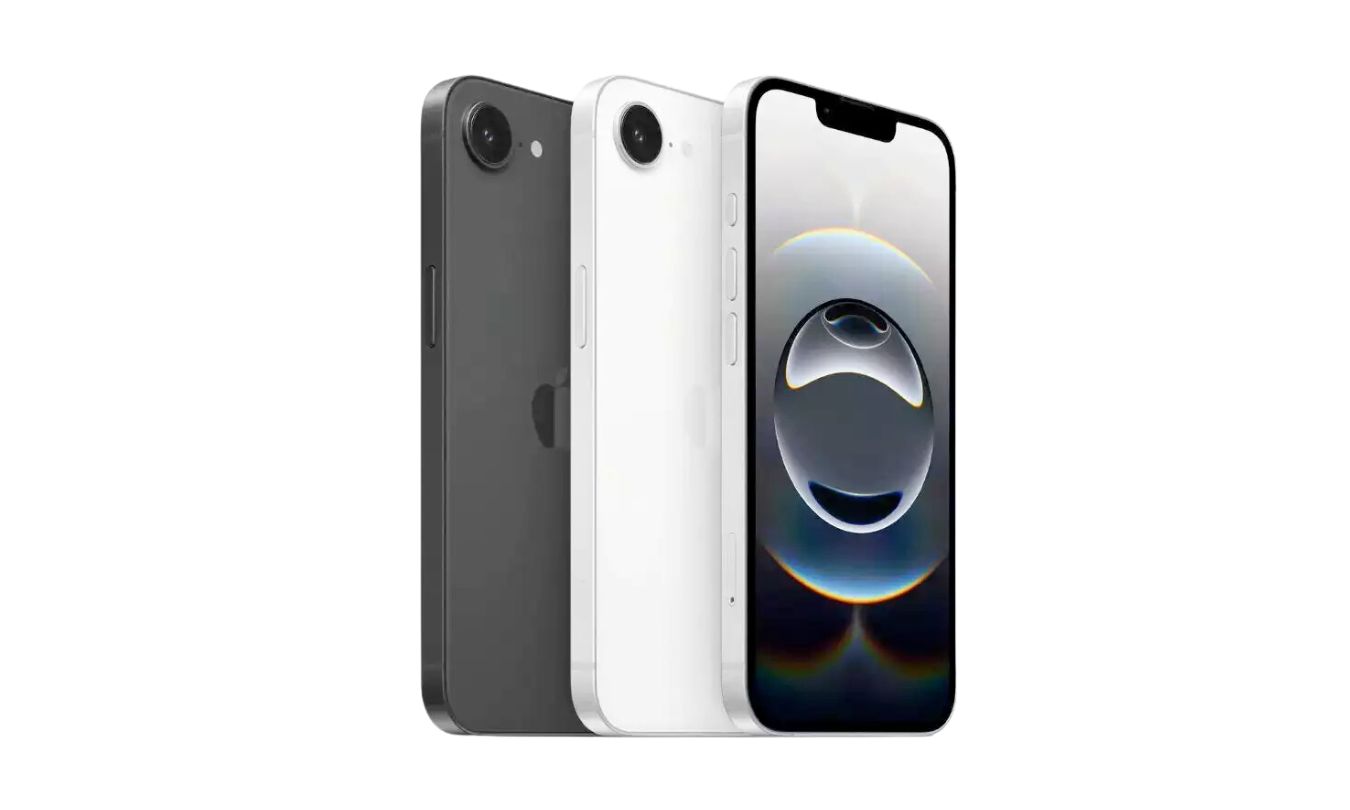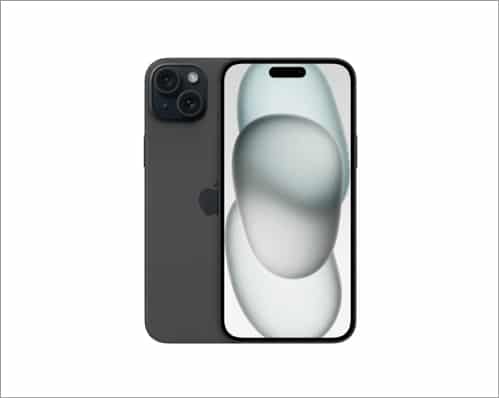Are you planning to buy a new iPhone but can’t decide which? With the new series launched every year, you’re probably overwhelmed by the range of options available. From the cutting-edge iPhone 16 Pro Max to the more budget-friendly iPhone 16e, Apple has an iPhone for every type of user. But how do you choose the right one? In this guide, we’ll break down the best iPhone to buy in 2025 for different needs, so you can make an informed decision.

What is the best iPhone in 2025?
The best iPhone depends on what you prioritize—whether it’s performance, affordability, or camera quality. Based on our rigorous testing, here’s a quick list of top picks for 2025:
- Best overall: iPhone 16 Pro Max
- Best for most people: iPhone 16
- Best budget-friendly: iPhone 16e
- Best for beginners: iPhone 15
Let’s examine each iPhone model’s features so you can match them to your requirements. We will also share our verdict at the end; therefore, keep reading!
1. Best overall – iPhone 16 Pro Max

Key specs:
- Display: 6.9-inch Super Retina XDR OLED, 120Hz refresh rate
- Processor: A18 Pro Bionic chip
- Storage options: 256GB, 512GB, 1TB
- Camera: 48MP Fusion (main) + 48MP (ultra-wide) + 12MP (5x telephoto)
- Battery life: 33 hours of video playback
- Price: Starts at $1199
If you are looking for a true flagship, consider nothing other than the latest iPhone 16 Pro Max. It is Apple’s most powerful device, designed for users who want nothing but the best.
The iPhone 16 Pro Max features the biggest 6.9-inch Super Retina XDR OLED display with the thinnest bezels Apple has ever offered. Moreover, the latest Ceramic Shield on display protects it from scratches and bumps. The ProMotion technology lets you enjoy vibrant colors, sharp resolution, and smooth navigation.
For the build, Apple has used Grade 5 titanium, making the device weigh just 227 grams. Powered by the blazing-fast A18 Pro Bionic chip, this iPhone handles anything from intensive gaming, 4K video editing, and Apple Intelligence’s on-device processing with ease. And don’t worry about overheating due to long usage! The iPhone 16 Pro Max has a new thermal internal design and back glass optimization to disperse heat better.
The showstopper for this year is the camera capabilities including 48MP Fusion main, 48MP Ultra Wide, and 12MP 5x telephoto lens. Apple included a new Camera Control button to enable users to quickly capture photos and videos and adjust camera settings with just a swipe. Moreover, you can record 4K 120fps Dolby Vision videos for the first time ever.
You can even change the playback speed after capturing the video. In terms of images, the Photographic Styles feature lets you edit photos with preset filters and adjust tones as you like. Additionally, the iPhone 16 Pro Max offers four studio-quality mics with the new Audio Mix feature. This allows you to capture and edit video voices and sounds like professionals.
With all these heavy-duty iOS 18 features, the incredible battery life can easily last a full day. Therefore, overall, the iPhone 16 Pro Max is the best iPhone to buy in 2025. It’s ideal for power users who want the best of the best, especially those who love photography, video editing, and gaming.
Tip: If you want this pro features in a compact design and less price, you may go for the iPhone 16 Pro starting at $999.
Pros
- Stunning OLED display
- Best-in-class camera system
- Long battery life
- Excellent performance with A18 chip
Cons
- Expensive
- Large sizes might not suit everyone
2. Best for most people – iPhone 16

Key specs:
- Display: 6.1 inch Super Retina XDR OLED, 60Hz
- Processor: A18 chip
- Storage options: 128GB, 256GB, 512GB
- Camera: 48MP Fusion (main) + 12MP (ultra-wide)
- Battery life: Up to 22 hours of video playback
- Price: Starts at $799
The iPhone 16 strikes a balance between high-end features and a reasonable price. Its compact form factor and light weight make it super portable. The display is 6.1-inch with 2000 nits peak brightness which can drop to 1 nit. So, you can enjoy your content in any lighting conditions.
Apple has incorporated the A18 Bionic chip made exclusively for Apple Intelligence. This new processor is 30% faster than the iPhone 15, offering stellar performance. In terms of the camera, the new 48MP Fusion primary sensor acts as a two-in-one lens. It can take super-high-resolution images or zoom in with the 2x optical-quality Telephoto.
Moreover, the Ultra Wide lens has support for macro and extremely wide shots. Both cameras are optimized for better low-light photography. This year, Apple has aligned the cameras vertically in iPhone 16 and 16 Plus to support Spatial photo and video for Vision Pro. It was previously available to iPhone 15 Pro models only.
I personally loved the iPhone 16 most because it offers many “Pro” features. It has the latest Ceramic Shield on the front, an improved Action button on the left side, and the new Camera Control button on the right side. So, you can accomplish everything with just a few button presses. Moreover, you can access Audio Mix and Photographic Styles features as well.
Also, the new design and color options stand out from the rest of the latest iPhone models. Conclusively, if you want a premium experience without splurging on the Pro Max, the iPhone 16 is a fantastic choice. It’s powerful, stylish, and delivers top-tier performance at a more approachable price.
Pros
- Powerful A18 chip
- Apple Intelligence
- Excellent camera performance
- Slightly more affordable than the Pro Max
Cons
- No telephoto lens
- Battery life is slightly shorter than the Pro models
3. Best budget-friendly – iPhone 16e

Key specs:
- Display: 6.1 inch Super Retina XDR OLED
- Processor: A18 chip
- Storage options: 128GB, 256GB, 512GB
- Camera: 48MP Fusion
- Battery life: Up to 26 hours of video playback
- Price: Starts at $599
If you’re looking for a value-for-money iPhone that delivers a premium Apple experience without breaking the bank, the iPhone 16e is the perfect choice. It brings Apple Intelligence features, bigger battery life, Apple’s first in-house 5G modem, and much more at a more affordable price.
Let’s know the basic iPhone 16e features! Its 6.1-inch display gives you bright visuals for everyday use. Unlike older budget models, Apple ditched the Home button for a modern edge-to-edge look. I also love its matte-textured finish, available in classic black and white, giving it a premium feel.
At the heart of the iPhone 16e is the A18 chip, ensuring smooth performance in daily tasks. Plus, Apple’s new C1 modem improves 5G connectivity. Moreover, this combination boosts power efficiency. According to Apple, the iPhone 16e gives you up to 26 hours of video playback.
In terms of photography, the 48MP Fusion camera system delivers crisp detail and sharpness. While it doesn’t have an ultra-wide lens, the main sensor does a great job in good lighting conditions. Additionally, you can access Visual Intelligence features through the Action Button.
Compared to the iPhone 16, the iPhone 16e lacks MagSafe support, retaining only standard wireless charging. If you use MagSafe accessories, you may face connectivity issues. Additionally, the Dynamic Island, Camera Control button, and several camera features are also missing.
Overall, if you’ve been holding out for an iPhone that’s budget-friendly but still powerful, the iPhone 16e is a no-brainer. It’s a step up from older SE models, with better performance, a fantastic camera, and a sleek design—all without the premium price tag.
Pros
- Apple’s first C1 5G modem
- A18 chip with Apple Intelligence features
- Strong battery life with fast USB-C charging
- Premium features at affordable price
Cons
- A single 48MP main sensor
- No MagSafe support
Check out on: Apple
4. Best for beginners – iPhone 15

Key specs:
- Display: 6.1 inch Super Retina XDR OLED
- Processor: A16 chip
- Storage options: 128GB, 256GB, 512GB
- Camera: 48MP (main) + 12MP (ultra wide)
- Battery life: Up to 20 hours of video playback
- Price: Starts at $699
If you’re wondering which iPhone is the best for beginners, here’s your answer. Though the official price is slightly more than the latest iPhone 16e, I suggest getting a refurbished model to make it truly value for money.
The iPhone 15 boasts the A16 Bionic processor, that’s more than enough power for gaming and heavy apps. You’ll love Dynamic Island on the bright, vibrant 6.1-inch OLED display. Moreover, the durable color-infused glass and aluminum exterior look elegant.
Besides, the main highlight is the upgraded 48 primary camera sensor with 2x optical zoom. Also, both have USB-C ports, though the transfer speed is limited to USB 2. You may enjoy lifesaving features on iPhone 15 such as Roadside assistance.
However, the battery and overall performance aren’t as great as the Pro models. But it’s good enough for most users and will last through the day. Also, if you want to access Apple Intelligence features, you may go for the iPhone 16e.
Though Apple has sliced the price tag, it may drop more. This makes iPhone 15 a better option compared to iPhone 16 if you don’t need the latest and greatest. You may also sell your old iPhone or trade in and upgrade to this model to save some more bucks.
Pros
- Good display with Dynamic Island
- Excellent battery life
- Great camera performance
Cons
- Heavier than iPhone 16 base model
- Lacks some of the advanced camera features
Which iPhone should you buy in 2025?
| Model | Best For | Price Range | Key Features |
| iPhone 16 Pro Max | Power users | $1,199+ | Best camera, A18 Pro chip, large display |
| iPhone 16 | Most people | $799+ | Pro features at a reasonable price |
| iPhone 16e | Budget-friendly | $599+ | Solid performance, AI features, strong battery life |
| iPhone 15 | Value for money | $699+ | Good display, Dynamic Island |
The iPhone 16 will be the best choice for most users, offering top-tier performance at a more reasonable price. If you’re a power user, content creator, or professional, the iPhone 16 Pro Max is unbeatable. Those on a budget will find the iPhone 16e to be an excellent option.
Which iPhone is not recommended?
As new iPhone models are released every year, older models can quickly become outdated. So, some devices become less advisable for purchase or continued use. In 2025, several iPhone models are not recommended for various reasons, including lack of software support, performance limitations, and overall value. Here’s the list:
- iPhone 13 Mini
- iPhone SE (2nd Generation, 2020)
- iPhone X and XR
- iPhone 7 and older
If you are lured to buy such iPhone models due to their price tag, I would suggest considering the refurbished iPhone 14.
Factors to consider when buying an iPhone
When choosing the right iPhone for you, several factors should come into play to ensure you get the device that best fits your needs. Here’s a detailed breakdown of the most important considerations:
- Price and budget: Set a budget before you start shopping. iPhones vary significantly in price, so finding a model that fits your financial plan is essential. Consider whether you want to buy outright or through a carrier plan, as this can affect your overall cost.
- Performance needs: Evaluate what you plan to do with your iPhone. If you’re a power user who engages in gaming, video editing, or multitasking, opt for models with the latest A-series chips (like the A18 or A17) for optimal performance. For general use, the A15 or A16 chips found in older models can suffice.
- Camera quality: Consider your photography needs. If you enjoy taking high-quality photos, look for models with advanced camera systems. The iPhone 16 Pro Max, for instance, features a 48MP main camera and a 5x telephoto lens. If casual photography is your goal, the standard iPhone 16 or iPhone 15 with a 48MP camera will meet your needs.
- Display size and quality: iPhones come in various sizes, from the compact iPhone SE to the larger iPhone 16 Pro Max. Think about how you use your phone: Do you prefer a larger screen for media consumption and gaming or a smaller, more portable device? Additionally, consider the display technology; models with ProMotion displays offer superior brightness and a 120Hz refresh rate.
- Battery life: Battery longevity is crucial, especially if you’re often on the go. Check the estimated battery life for each model. For example, the iPhone 16 Pro Max offers up to 33 hours of video playback, while the iPhone SE has a shorter battery life. If you frequently use your phone throughout the day, prioritize models known for their robust battery performance.
- Storage capacity: Assess your storage needs based on how you use your iPhone. If you take a lot of photos, download apps, or store videos, consider models with larger storage options (like 512GB or 1TB). For light users who primarily use cloud storage or don’t store many files, the base storage options (128GB) may suffice.
- Future-proofing: Think about how long you plan to keep your iPhone. If you typically upgrade every year, you might opt for the one-year older models to save some bucks. If you plan on keeping your phone for several years, then a higher-end model would be worth investing in.
- Operating system compatibility: Make sure that the specific iPhone model you select can accommodate all current iOS versions over a prolonged period. Apple usually provides software updates for around five to six years with new features and security enhancements.
How we evaluate iPhone models
We carry out rigorous tests in order to offer an accurate and comprehensive guide. It examines numerous areas, such as performance, usability, and other functional attributes. The following gives us more detailed information about the testing process we have adopted:
- Performance testing: Each iPhone model’s general speed and responsiveness were evaluated using Geekbench or AnTuTu benchmark tools among others. These tests measure CPU and GPU performance under varying workloads such as gaming, multi-tasking or launching applications. In addition, several apps were launched at once during the real-life assessments to see how well the device could serve day-to-day activities.
- Camera quality assessment: Our camera testing involves taking photos and videos in different lighting conditions (low light, daylight, and artificial light) to analyze image quality, color accuracy, and dynamic range. We compare the camera performance across different models, focusing on features like Night mode, Portrait mode, and video stabilization. We also assess the front-facing camera for selfies and video calls.
- Battery life evaluation: We conduct battery life tests by using the iPhone in various scenarios, such as video playback, web browsing, and gaming. We monitor how long the battery lasts under typical usage conditions and how quickly it charges with the included charger and wireless charging options. Additionally, we evaluate battery health over time to determine how well the device retains its capacity.
- Display quality analysis: We evaluate the display quality by measuring brightness, color accuracy, and viewing angles. This includes using tools to assess peak brightness levels and color reproduction. We also perform subjective assessments by comparing how the display looks in different lighting conditions and how it performs during media consumption, such as watching videos or playing games.
- User experience testing: We assess the overall user experience by evaluating the iOS interface, ease of navigation, and accessibility features. This includes testing the responsiveness of touch gestures, the effectiveness of Face ID or Touch ID, and the overall fluidity of the operating system. We also consider the quality of built-in apps and features, such as Siri, Apple Maps, and iMessage.
- Durability testing: We assess water and dust resistance based on the IP rating of the device. This helps determine how well the iPhone can withstand everyday wear and tear.
- Audio quality assessment: We test the audio quality of the iPhone’s speakers and microphones by playing music, making calls, and recording audio. We evaluate clarity, volume, and bass response, as well as how well the microphones pick up sound in different environments.
- Connectivity testing: We evaluate the performance of cellular connectivity, Wi-Fi, and Bluetooth. This includes testing call quality, data speeds, and connection stability in various environments. We also assess how well the iPhone connects to other devices, such as AirPods and smart home products.
In performing these detailed tests for all iPhone models, we believe that we are able to offer an unbiased analysis. Therefore, let’s say you want to purchase an iPhone but don’t know what model suits your taste; this article will help you decide which one would be ideal for you.
Signing off…
We hope this guide helps you find the best iPhone to buy for yourself in 2025. Choosing the right iPhone comes down to understanding your needs and budget. With this guide, you’re equipped to make the right decision, whether you need a premium powerhouse or a budget-friendly iPhone.
FAQs
The iPhone 16 Pro Max features the most advanced camera system, including a 48MP main lens, 48MP Ultra Wide, and a 5x telephoto lens. The main lens is called a Fusion camera, as it can capture 12MP 2x telephoto images. Moreover, you can record 4K 120fps Dolby Vision videos. So, it is the best choice for photography enthusiasts.
iPhones generally receive software updates for around 5-6 years, ensuring they remain functional and secure for a long time.
The best places to buy an iPhone include the official Apple Store, authorized retailers, and reputable online platforms such as Best Buy, Walmart, and Amazon.
You may want to take a peek at:

